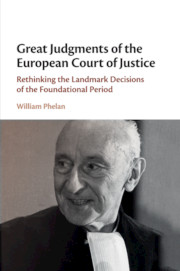 Great Judgments of the European Court of Justice
Great Judgments of the European Court of Justice Published online by Cambridge University Press: 04 November 2020
The introduction sets out the book’s approach to the great judgments of the European Court of Justice (ECJ) between 1961 and 1979. Each of the Court’s landmark cases will be analyzed in comparative context, in particular by contrast to the enforcement and escape mechanisms commonly employed in international trade treaties including the postwar General Agreement on Tariffs and Trade (GATT) and today’s World Trade Organization (WTO). The book will also discuss the explanations for these judgments put forward by some of the most influential lawyers then working at the Court, above all French ECJ judge and later President of the Court Robert Lecourt. The introduction sets out the argument that the greatest innovations of the European legal order, including the new role for private individuals and national courts provided for by the doctrines of direct effect and supremacy, were directly linked to addressing the practical problem of how to effectively enforce trade treaty obligations while prohibiting unilateral safeguards and inter-state retaliation.
To save this book to your Kindle, first ensure [email protected] is added to your Approved Personal Document E-mail List under your Personal Document Settings on the Manage Your Content and Devices page of your Amazon account. Then enter the ‘name’ part of your Kindle email address below. Find out more about saving to your Kindle.
Note you can select to save to either the @free.kindle.com or @kindle.com variations. ‘@free.kindle.com’ emails are free but can only be saved to your device when it is connected to wi-fi. ‘@kindle.com’ emails can be delivered even when you are not connected to wi-fi, but note that service fees apply.
Find out more about the Kindle Personal Document Service.
To save content items to your account, please confirm that you agree to abide by our usage policies. If this is the first time you use this feature, you will be asked to authorise Cambridge Core to connect with your account. Find out more about saving content to Dropbox.
To save content items to your account, please confirm that you agree to abide by our usage policies. If this is the first time you use this feature, you will be asked to authorise Cambridge Core to connect with your account. Find out more about saving content to Google Drive.